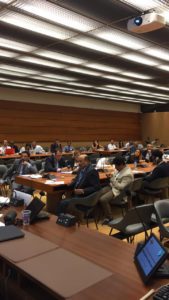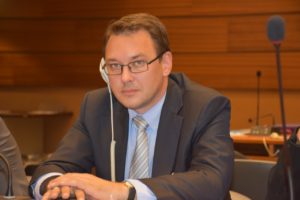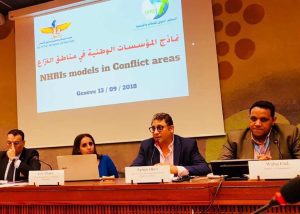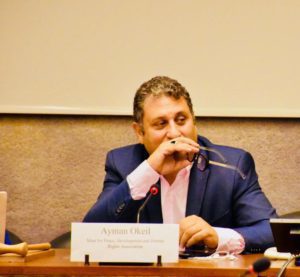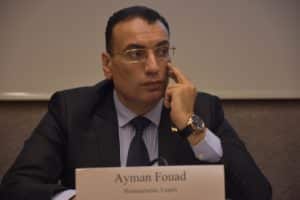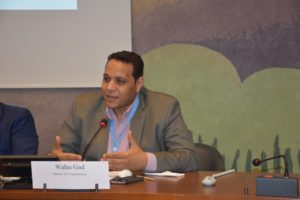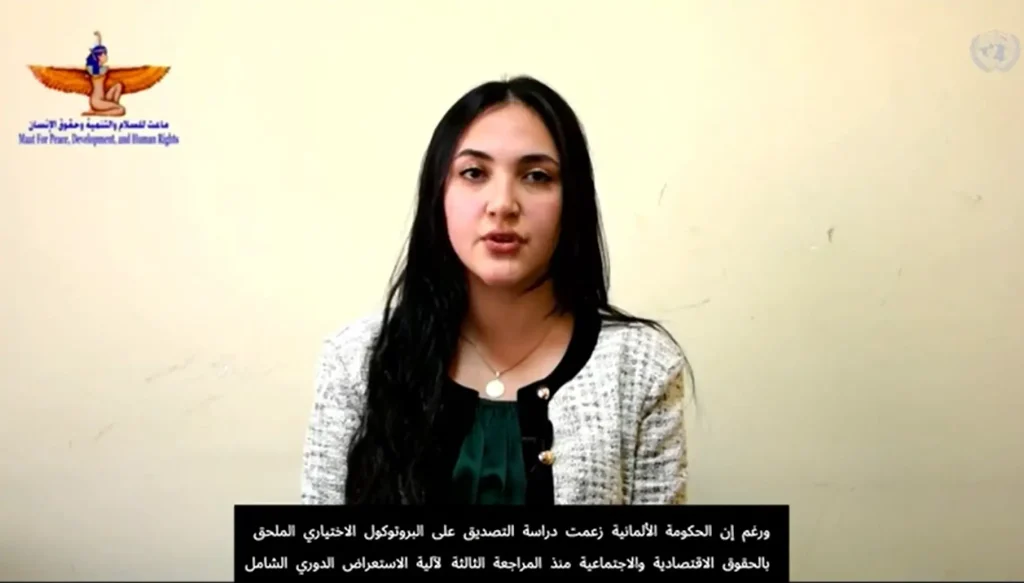At the United Nations headquarters in Geneva on the sidelines of the 39th session of the Human Rights Council
Maat and the International Alliance discuss the role of national institutions in conflict areas
Akil: Politicization is the biggest challenge facing the work of national institutions.
Al-Badawy: The report of the Committee of Experts in Yemen contains gross inaccuracies. Activists confirm: the UN mechanisms in Yemen have failed
On the sidelines of its participation in the 39th session of the Human Rights Council meetings in Geneva, the Maat Foundation for Peace, Development and Human Rights, and the International Alliance for Peace and Development held a symposium at the United Nations headquarters in Geneva under the title “Arab National Human Rights Institutions Focusing on Conflict Areas”, on Thursday 13 September 2018. Where the symposium witnessed an intense presence of human rights experts, activists, officials and media representatives participating in the 39th session of the Council, which started its work early this week.
The symposium dealt with the situation of national human rights institutions in the Arab region, and presented an evaluation vision of their role during the current and next stage. The symposium paid special attention to national institutions in regions experiencing armed conflicts such as Yemen, Libya and Syria, in an attempt to explore their role in bridging the gap between the conflicting parties and monitoring the rights situation People associated with war, encouraging dialogue, adopting peace options, and leading the process of reconciliation and equity in the post-conflict phase.
During his speech, Ayman Aqil, President of Maat Foundation and Coordinator of the International Alliance for Peace and Development, indicated that the most prominent challenge facing national institutions in the Arab region is the politicization of their work and the adoption of the political orientations of some regimes in a clear violation of human rights principles, and the persistence in practicing subjective and immoral actions to attack human rights situations In some countries, the absence of real interest in helping victims of violations.
With regard to conflict countries, Aqeel stressed that national institutions must have a role in addressing human rights aspects in these societies, as they can play an active role in promoting peace and encouraging efforts aimed at stopping war and fighting and returning to dialogue, and they can also support justice processes. Transition and reconciliation after the conflict, and stressed what has been proven by many international experiences and human rights practices in societies that have witnessed political and military conflicts, that the existence of a national institution during the conflict may enhance dialogue between moderates and create a kind of oversight over the transgressions practiced by either party to the conflict.
Counselor Dr. Ayman Fouad, a human rights expert and former advisor to the National Council for Human Rights in Egypt, spoke about the regulatory frameworks for national institutions and their operationalization on the ground, and pointed out that regardless of the legal form of the national institution, the ruling point is the extent of its compliance with the principles of Paris, and he praised some The good experiences in the Arab region are like the Moroccan, Tunisian and Egyptian experience to a large extent.
For his part, Dr. Walaa Jad Al-Karim, Head of Partners for Transparency, presented a comparative vision among national human rights institutions in the Arab region, during which he focused on the availability of standards of independence and pluralism in these institutions, noting that countries such as Egypt, Tunisia and Morocco possess a pluralistic framework as a result of the existence of Political parties, trade union movement and elected parliaments, which was reflected in the independence and plurality of forming their national institutions, while the corresponding institutions in some Gulf countries were born in societies without pluralism and do not know trade unions and civil society, and there is no freely elected parliament to appoint the members of the national institution. It turned into a mere acoustic phenomenon and a hollow echo of some ruling systems.
The human rights expert, Lisa Al-Badawi, presented an assessment of the status of the national institution in Yemen, and focused on the negative impact of the weakness of the national institution on the role played by some UN mechanisms in Yemen, noting that there is an absence of coordination between the UN mechanisms in Yemen in general, as well as the lack of a minimum The methodology in much of what is issued by some international human rights bodies towards Yemen, and this was evidenced by the report of the United Nations High Commissioner for Human Rights, concerning the report of the Committee of Experts on the Situation of Human Rights in Yemen, which included gross methodological inaccuracies resulting from the fact that the authors of the report fell under the pretext of information and lack of communication With all the actors.
The High Commissioner's report raised widespread objections from the experts and the participating activists, as the interventions revealed that there was a widespread rejection of the report in the human rights community, and the interventions focused on “the commission exceeding its mandate and jurisdiction”, as it is a committee formed under Item 10 related to technical support, and it was not It has the authority, the foundations, and the capabilities to investigate, monitor and document facts, so it has been involved in misleading and false information.
Participants in the symposium also demanded that the mandate of the team concerned with Yemen not be extended, given that it did not provide any tangible role on the ground, and that it, along with other UN human rights mechanisms concerned with Yemen, was satisfied with obtaining information from sources close to armed militias, and adopting the viewpoint of parties benefiting from the presence of these militias. Supported by Iran, the UN human rights product on Yemen often ignores this central angle in understanding the human rights impact of the conflict and directs objective and illogical criticisms of the Arab coalition based on international legitimacy decisions completely.
The symposium dealt with the situation of national human rights institutions in the Arab region, and presented an evaluation vision of their role during the current and next stage. The symposium paid special attention to national institutions in regions experiencing armed conflicts such as Yemen, Libya and Syria, in an attempt to explore their role in bridging the gap between the conflicting parties and monitoring the rights situation People associated with war, encouraging dialogue, adopting peace options, and leading the process of reconciliation and equity in the post-conflict phase.
During his speech, Ayman Aqil, President of Maat Foundation and Coordinator of the International Alliance for Peace and Development, indicated that the most prominent challenge facing national institutions in the Arab region is the politicization of their work and the adoption of the political orientations of some regimes in a clear violation of human rights principles, and the persistence in practicing subjective and immoral actions to attack human rights situations In some countries, the absence of real interest in helping victims of violations.
With regard to conflict countries, Aqeel stressed that national institutions must have a role in addressing human rights aspects in these societies, as they can play an active role in promoting peace and encouraging efforts aimed at stopping war and fighting and returning to dialogue, and they can also support justice processes. Transition and reconciliation after the conflict, and stressed what has been proven by many international experiences and human rights practices in societies that have witnessed political and military conflicts, that the existence of a national institution during the conflict may enhance dialogue between moderates and create a kind of oversight over the transgressions practiced by either party to the conflict.
Counselor Dr. Ayman Fouad, a human rights expert and former advisor to the National Council for Human Rights in Egypt, spoke about the regulatory frameworks for national institutions and their operationalization on the ground, and pointed out that regardless of the legal form of the national institution, the ruling point is the extent of its compliance with the principles of Paris, and he praised some The good experiences in the Arab region are like the Moroccan, Tunisian and Egyptian experience to a large extent.
For his part, Dr. Walaa Jad Al-Karim, Head of Partners for Transparency, presented a comparative vision among national human rights institutions in the Arab region, during which he focused on the availability of standards of independence and pluralism in these institutions, noting that countries such as Egypt, Tunisia and Morocco possess a pluralistic framework as a result of the existence of Political parties, trade union movement and elected parliaments, which was reflected in the independence and plurality of forming their national institutions, while the corresponding institutions in some Gulf countries were born in societies without pluralism and do not know trade unions and civil society, and there is no freely elected parliament to appoint the members of the national institution. It turned into a mere acoustic phenomenon and a hollow echo of some ruling systems.
The human rights expert, Lisa Al-Badawi, presented an assessment of the status of the national institution in Yemen, and focused on the negative impact of the weakness of the national institution on the role played by some UN mechanisms in Yemen, noting that there is an absence of coordination between the UN mechanisms in Yemen in general, as well as the lack of a minimum The methodology in much of what is issued by some international human rights bodies towards Yemen, and this was evidenced by the report of the United Nations High Commissioner for Human Rights, concerning the report of the Committee of Experts on the Situation of Human Rights in Yemen, which included gross methodological inaccuracies resulting from the fact that the authors of the report fell under the pretext of information and lack of communication With all the actors.
The High Commissioner's report raised widespread objections from the experts and the participating activists, as the interventions revealed that there was a widespread rejection of the report in the human rights community, and the interventions focused on “the commission exceeding its mandate and jurisdiction”, as it is a committee formed under Item 10 related to technical support, and it was not It has the authority, the foundations, and the capabilities to investigate, monitor and document facts, so it has been involved in misleading and false information.
Participants in the symposium also demanded that the mandate of the team concerned with Yemen not be extended, given that it did not provide any tangible role on the ground, and that it, along with other UN human rights mechanisms concerned with Yemen, was satisfied with obtaining information from sources close to armed militias, and adopting the viewpoint of parties benefiting from the presence of these militias. Supported by Iran, the UN human rights product on Yemen often ignores this central angle in understanding the human rights impact of the conflict and directs objective and illogical criticisms of the Arab coalition based on international legitimacy decisions completely.
